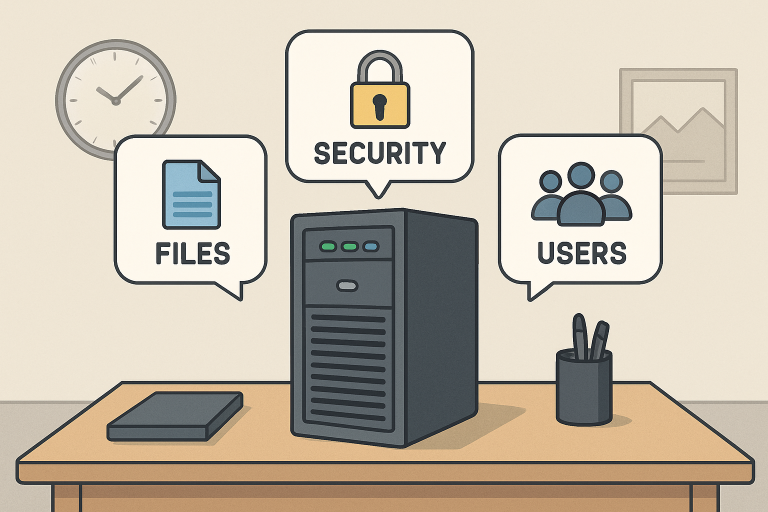Contents
Key Takeaways
- Understanding your specific business needs will help determine optimal server requirements.
- Scalability, security, and budgeting should guide your selection process for long-term value.
- Total cost of ownership, including energy and maintenance, influences the effectiveness of your investment.
Table of Contents
- Introduction
- Assess Your Business Needs
- Understand Server Components
- Evaluate Scalability
- Consider Your Budget
- Prioritize Security Features
- Calculate Total Cost of Ownership
- Plan for Maintenance and Support
- Make an Informed Decision
Introduction
Selecting the correct tower server is one of the most critical technology decisions a business can make. The right choice ensures your company runs efficiently today and remains scalable for tomorrow’s opportunities. For organizations seeking powerful business solutions, understanding the criteria for server selection is paramount to supporting growth, data security, and streamlined performance.
Before finalizing your purchase, it’s crucial to consider your current requirements and anticipate future needs. The proper tower server sets the foundation for reliable daily operations and long-term success, from workload management to maintaining sensitive client data securely.
Assess Your Business Needs
The first step in choosing a tower server is thoroughly assessing your business’s operational needs. Are you looking to centralize file sharing, manage databases, or run line-of-business applications? Small businesses may only need a basic server for office file management, while growing, data-driven companies might require higher capacity and speed to run databases or business applications smoothly.
Estimating the number of users, primary applications, and types of workloads will help you define the minimum processor power, memory, and storage you require. Knowing whether you expect high traffic volumes or spikes will also clarify whether your new server needs additional bandwidth or redundancy options.
Understand Server Components
To find a tower server that aligns with your business goals, get familiar with these crucial server components:
- Processor (CPU): Handles data processing; look for multiple cores and threads if your workloads are computationally intensive.
- Memory (RAM): More RAM means better multitasking capability, ensuring applications run without lag, especially during peak usage.
- Storage: Choose between Hard Disk Drives (HDDs) for cost-effective bulk storage or Solid-State Drives (SSDs) for faster data access. Many businesses employ a mix to balance speed and capacity. Redundancy options like RAID can further help protect business data.
PCMag’s business server guide provides detailed recommendations for an in-depth look at server hardware and its impact on business operations.
Evaluate Scalability
Business needs are dynamic, making scalability a key element in server selection. Look for tower servers that make it simple to add more RAM, additional drive bays, or even second processors as your organization expands. Modular designs help avoid the cost and disruption of migrating to an entirely new server every time your company scales up.
Factoring in future software updates, anticipated data growth, or expansion into new business functions can help you gauge how much upgrade headroom you need.
Consider Your Budget
Budget considerations often play the most decisive role when businesses evaluate server options, sometimes even outweighing performance and scalability. While initially choosing the lowest-cost solution may seem practical, this short-term saving can quickly become a long-term expense. Undersized or underpowered servers often struggle to handle growing workloads, leading to performance bottlenecks, costly downtime, or the need for premature upgrades. Instead of focusing solely on price, organizations should balance upfront costs against the value of long-term reliability, efficiency, and performance. A server that scales with your business helps avoid disruption and supports smoother growth.
Additionally, many vendors recognize companies’ financial constraints and provide flexible financing or leasing programs. These arrangements allow companies to manage cash flow effectively while still accessing enterprise-grade solutions. By adopting a strategic approach to budgeting, organizations can invest in infrastructure that delivers both immediate affordability and future-proof stability.
Prioritize Security Features
Protecting your business data and ensuring compliance with regulations are non-negotiable in today’s business landscape. Look for server models with built-in hardware firewalls, support for secure boot, encrypted storage options, and the ability to integrate with virtual private network (VPN) solutions. These features are critical for safeguarding confidential information from cyber threats.
Businesses handling sensitive data should also seek servers offering advanced security management features, such as intrusion detection and regular firmware updates.
Calculate Total Cost of Ownership
The initial purchase price is only part of the investment. Over time, ongoing costs such as energy consumption, cooling requirements, warranty extensions, and regular maintenance increase. Efficient power supplies, energy-saving processors, and robust cooling can significantly lower the total cost of ownership, especially in server rooms or offices where multiple units are running continuously.
For insights into how lower energy use and strong reliability can save on operating expenses, ZDNet’s server buying guide offers practical advice backed by data.
Plan for Maintenance and Support
Hardware inevitably requires maintenance and support, no matter how reliable a server is. Choose a vendor known for responsive customer service and a solid warranty program. Consider purchasing support contracts for fast replacement parts, remote troubleshooting, and on-site service to minimize downtime and business disruption. Consistent software and firmware updates help keep your infrastructure secure and running at peak performance.
Make an Informed Decision
Choosing the correct tower server for your business doesn’t have to feel overwhelming. The key lies in a structured approach that balances present requirements and future growth. Start by assessing your company’s unique workloads, applications, and performance demands to determine the level of processing power, memory, and storage you need. Understanding critical hardware components will help you make comparisons and avoid unnecessary expenses. Budgeting wisely means evaluating upfront costs and accounting for long-term maintenance, upgrades, and energy efficiency. Robust security features should be prioritized to safeguard sensitive data and ensure compliance with industry regulations. Additionally, planning for reliable vendor support and warranties can help minimize downtime and protect your investment. By dedicating time to research and preparation, you can confidently select a tower server solution that aligns with your strategic goals and equips your business for future opportunities.

